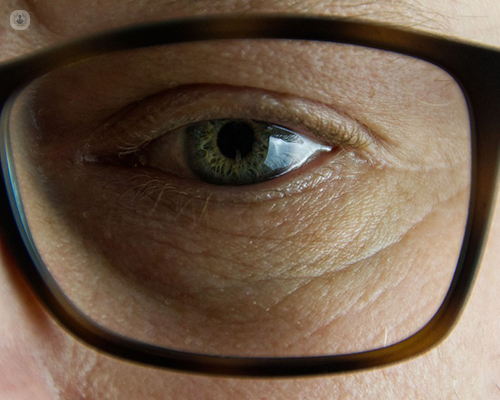An expert's guide to diabetic retinopathy
Written by:Diabetic retinopathy is a condition that can lead to blindness if not treated promptly. In his latest article, leading ophthalmologist Mr Aires Lobo offers his expert insight into this condition, including the causes, symptoms and available treatments.

What eye diseases can be caused by diabetes?
Diabetes is a condition that affects a person right from the top of the head to the bottom of their feet. Similarly, it affects the eye from the front the eye to the back of the eye. Most commonly it tends to cause problems with the retina.
Diabetes can cause eye problems such as:
- Abnormal blood vessels growing at the back of the eye
- Bleeding inside the eye
- Swelling in the retina
- Cataracts
- Eye inflammation
- Raised intraocular pressure
What are the symptoms of diabetic retinopathy?
Most commonly diabetic retinopathy doesn't have symptoms until it's quite late. This is why we have a program available in the United Kingdom called the Diabetic Eye Screening program. This programme screens people with diabetes for diabetic eye disease every year. They will pick up if there's a problem and they will refer the person to the eye clinic.
By the time you notice symptoms like blurry vision or floaters then you're already quite far down the road of having a moderate to advanced diabetic eye disease. Depending on the diabetic status of the patient, it can happen very soon as well

What treatments are available for diabetic retinopathy?
Often when I see patients with diabetic eye disease, I usually spend more time talking to them about the diabetic care and support they are getting from their general practitioner. I also speak to them about their diet, their level of fitness and their understanding of diabetes so that's the foundation I like to build with the patients. I do this because it sets the baseline for everything that will happen in the future.
The next step is then taking some photographs and doing some scans. I go through the results with the patient, and help them understand how diabetes is affecting their eye. They are then in a situation where they take ownership of what's happening to them, and depending on the level of diabetic eye disease we decide what the way forward is. We will continue with observation if I feel that the patient is going to take ownership of their diabetic care and look after themselves.
I usually tell them to take better care of themselves, and that some of these things are reversible. If I feel that's not the case and the patient may not be very good at attending the clinic, and if it is quite a bit more advanced or if they have quite bad swelling at the back of the eye, then I may decide I would like to do intravitreal injections of steroids.
If it is very advanced with new blood vessels at the back then I may suggest laser treatment which is much more aggressive, and much more widespread at the back of the eye. The possible side effects of this need to be discussed with the patient. At the end of the day what I want is for the patient to have a good outcome.
Can diabetic retinopathy lead to blindness?
Yes, diabetic eye disease can lead to blindness and it does happen even in this day and age. I feel very sad when that happens to any of my patients. I can usually predict which patients are going down this route and I try and get them as much more support as possible, but yes patients can lose vision and be visually impaired if they are not careful with their diabetes as a result of diabetic eye disease.

Can diabetic retinopathy be reversed?
Diabetic eye disease can be reversed if it is caught in the very early stages. If you get a report from the Diabetic Eye Screening program, saying you've got the early stages of diabetic eye disease and you take the action to look after your diabetes then usually it is reversible in those early stages. After a certain point it will probably not get any better, but what you don't want is to make it worse. Even if it's gotten to an advanced stage, you can stop it from getting worse by looking after yourself and managing your diabetes.
If you are concerned about diabetic retinopathy or any other diabetes-related condition, you can book a consultation with Mr Aires Lobo today via his Top Doctors profile.


